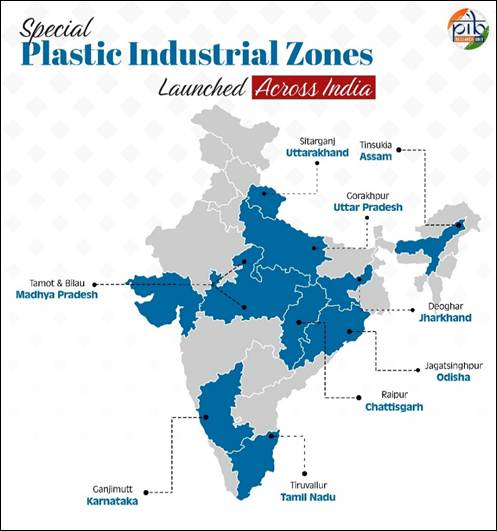Syllabus: GS 3/Environment
In News
- The Plastic Parks scheme is promoting industrial growth and environmental sustainability in India’s plastics sector.
Plastic Park
- It is an industrial zone specifically designed for plastic-related businesses and industries.
- It aims to consolidate and synergize the capacities of the plastic processing industry, promoting investment, production, and exports while generating employment.
- These parks also focus on achieving environmentally sustainable growth through waste management and recycling initiatives.
Importance and Progress
- Plastic Parks have emerged as an integral part of India’s strategy for managing plastic waste, promoting recycling, and supporting the chemical industry.
- India ranks 12th globally in plastic exports, with exports growing from $8.2 billion in 2014 to $27 billion in 2022, driven by government efforts like the Plastic Parks scheme.
- 10 Plastic Parks have been approved so far in different States.

Existing Issues
- The Indian plastics industry was large but highly fragmented with dominance of tiny, small and medium units and thus lacked the capacity to tap this opportunity.
Governments Efforts
- The Department is implementing a scheme to support setting up need based Plastic Parks, with requisite state-of-the-art infrastructure, enabling common facilities through cluster development approach, to consolidate the capacities of the domestic downstream plastic processing industry.
- The scheme aims to increase investment, production and export in the plastics sector.
- Under the scheme, the government of India provides grant funding up to 50% of the project cost subject to a ceiling of Rs.40 crore per project.
Conclusion
- The Plastic Parks concept is a revolutionary venture aimed at improving the infrastructure of plastic processing in India.
- The Plastic Parks scheme is a strategic initiative to boost India’s plastic industry by enhancing production, exports, and innovation, while ensuring sustainable and environmentally responsible growth.
- As India’s global presence in plastic trade grows, the scheme remains vital to ensuring that this growth is sustainable, inclusive, and driven by innovation.
Source: PIB